| Our Solution: | Full mouth reconstruction with implants and over dentures with the use of telescopic technique |
|---|
Mr B suffers from a very heavy bite, which over the years had led to a general poor condition of his teeth, both in his upper jaw and lower jaw. Although several teeth needed to be extracted, Mr B was keen to retain some of his remaining teeth. The strategy adopted was to keep only three teeth in his upper jaw and place a further three locator implants. In his lower jaw six locator implants would also be inserted. The procedure would utilize Telescopic Dentures.
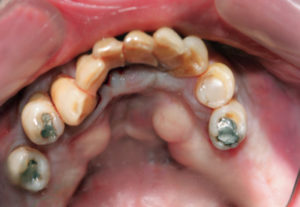
Before
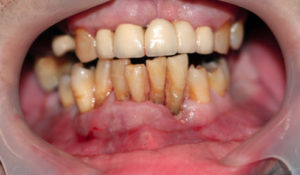
Before
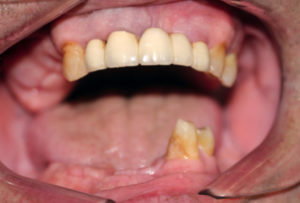 Developed back in 1968 by a German professor, this technique offers a really affordable alternative to other implant retained denture systems. For us at the Surbiton Smile Centre ® we were able to have a much faster laboratory turnaround time, which helped Mr B as well.
Developed back in 1968 by a German professor, this technique offers a really affordable alternative to other implant retained denture systems. For us at the Surbiton Smile Centre ® we were able to have a much faster laboratory turnaround time, which helped Mr B as well.
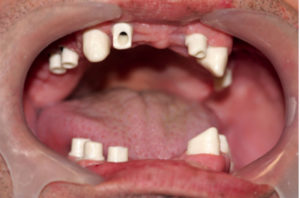 As Mr B had enough teeth remaining in his mouth, our dentist was able to prepare these teeth with a drill so that a ‘crown’ could be fitted over each tooth. This crown is in a shape of a cone with a 5o taper and is not the normal bell-shape of a natural tooth. These inner caps (called primary crowns) were then permanently cemented over the prepared teeth and also onto the abutments of the implants. An outer cap (called a secondary crown) was then placed on top which looks like a natural tooth and combines with the denture.
As Mr B had enough teeth remaining in his mouth, our dentist was able to prepare these teeth with a drill so that a ‘crown’ could be fitted over each tooth. This crown is in a shape of a cone with a 5o taper and is not the normal bell-shape of a natural tooth. These inner caps (called primary crowns) were then permanently cemented over the prepared teeth and also onto the abutments of the implants. An outer cap (called a secondary crown) was then placed on top which looks like a natural tooth and combines with the denture.
The outer cap intimately slides over the inner cap, just like the rings of a telescope. When they are pulled apart resistance can be felt. Thus, our constructed telescopic denture is held in place by friction, enabling ease of cleaning and simplicity of denture repair if required. In Mr B’s case there were a sufficient number of outer caps incorporated into the body of the denture, therefore eliminating the need to cover the palate (roof of the mouth).
At the Surbiton Smile Centre ®, we place great emphasis on the importance of maintaining excellent oral hygiene. In the case of Mr B, his treatment kept healthy teeth in place, which resulted in a smaller size of denture. However, the longevity of the treatment is reliant on the health of his remaining teeth. Mr B has regular appointments with our hygienist, and he returns to us for six monthly routine check-ups. His confident smile tells us of a job well done.
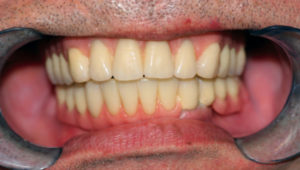
After
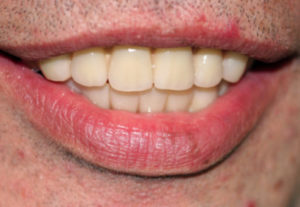
After
If your oral hygiene is deficient, bacterial infections can damage the gums (gingiva). Pockets next to the teeth are formed through which bacteria can enter the bloodstream, where they challenge the immune system, promote the calcification of blood vessels and may have other consequences on your health. If the gingival pockets become inflamed due to accumulated bacteria (periodontitis, also known as gum disease) then this often creates a burden on the entire human body. Both tooth decay (caries) and periodontitis are triggered by a bacterial known as dental plaque. Removing and preventing this build-up is of crucial importance. By regularly cleaning the surfaces of your teeth and the interdental spaces in- between your oral health will be greatly improved. Film. A regular visit to our hygienist will provide the finishing touches.
Good oral hygiene ensures that the protective mechanisms against pathogens both in the mouth and in the saliva are active. Healthy gums are therefore important for the health of your mouth, your entire body and ensure a long service life for the dental implants.
Please get in touch if you are concerned about any aspect of your dental health. We will treat you fairly and honestly - and we look forward to being able to help you.
